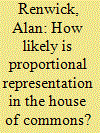| Srl | Item |
| 1 |
ID:
162578


|
|
|
|
|
| Summary/Abstract |
It is widely recognised—by both Remainers and Leavers—that the quality of public debate in the lead‐up to the UK's 2016 referendum on EU membership was dismal. That was partly because of the nature of the referendum itself: it was on a broad proposal rather than a specific law; the government that called it did not support the change on the ballot paper and refused to prepare for the possibility of a vote for leaving the EU. It was also influenced by the nature of the campaign: both sides propagated misinformation; key issues were barely discussed; the public were often left dissatisfied and bewildered. This paper sets out evidence on these points and then analyses whether anything could be done to address them. Drawing on recent comparative research into referendums, it explores the importance of preparing for the decision to call a referendum. It then examines three possible approaches to improving political discourse during the campaign itself: exposing misinformation; providing high‐quality information; and promoting citizen deliberation. It finally considers how these could be applied to possible referendums on the issue of the UK's EU membership.
|
|
|
|
|
|
|
|
|
|
|
|
|
|
|
|
| 2 |
ID:
103540


|
|
|
|
|
| Publication |
2011.
|
| Summary/Abstract |
The scandal over MPs' expenses that erupted in 2009 was followed by a surge in discussion of electoral reform. A range of reforms to Westminster's existing electoral system are now high on the political agenda. This article examines the extent and the nature of the scandal's impact on the electoral reform debate and draws out comparative implications for the sorts of conditions that can force politicians to accept electoral reforms that they do not want. It finds that the expenses scandal significantly changed debate about some electoral reform topics, but not about others. It proposes three factors likely to increase the impact of scandal in sparking reform: that the scandal is seen as harming ordinary people in their daily lives; that reforms can readily be understood as likely to mitigate the sources of scandal; and that those reforms do not seriously harm politicians' own perceived interests.
|
|
|
|
|
|
|
|
|
|
|
|
|
|
|
|
| 3 |
ID:
091109


|
|
|
|
|
| Publication |
2009.
|
| Summary/Abstract |
This article asks what international evidence suggests about the likelihood of major reform of the system used to elect the British House of Commons. It identifies four paths that have generated major electoral reform or come close to doing so in established democracies in recent decades and examines how likely each is to lead to reform in the UK. It argues that, on this evidence, reform in the UK is unlikely but not impossible.
|
|
|
|
|
|
|
|
|
|
|
|
|
|
|
|
| 4 |
ID:
135892


|
|
|
|
|
| Summary/Abstract |
The Electoral Reform Society has recently published two reports putting the case for electoral reform in local government. These suggest acceptance, in the wake of defeat in the 2011 Alternative Vote referendum, that the group's ultimate goal of change to the Westminster electoral system is unlikely to be fulfilled soon and that a more gradual strategy is therefore needed. This paper examines this shift by asking three questions. First, is Westminster electoral reform really a dead letter? Second, is local electoral reform more likely—and, if so, just how much more likely? Third, would local electoral reform matter in itself?
|
|
|
|
|
|
|
|
|
|
|
|
|
|
|
|
| 5 |
ID:
070211


|
|
|
| 6 |
ID:
162594


|
|
|
|
|
| Summary/Abstract |
The Citizens’ Assembly on Brexit was a major exercise in deliberative public engagement conducted in autumn 2017. It brought together fifty randomly selected members of the public for two carefully structured weekends of listening, learning, reflecting and discussing. Assembly members considered what post‐Brexit arrangements the UK should pursue, focusing on trade and migration. On trade, most members wanted the UK to pursue a bespoke arrangement with the EU and rejected the option of leaving the EU with no deal. On migration, most wanted the UK to maintain free movement of labour while using already available policy levers to reduce immigration numbers. These findings provide unique insight into informed public opinion on vital, pressing policy questions. The Assembly also illustrates the valuable role that such deliberative exercises could play in UK democracy. We suggest they could be particularly helpful for unlocking progress on issues such as the future of social care, that are often felt to be ‘too difficult’ to handle.
|
|
|
|
|
|
|
|
|
|
|
|
|
|
|
|